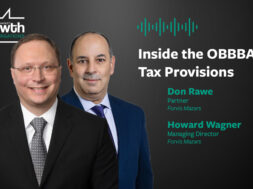Proposed Loss Of Interest Deduction Would Boost Cost of PE Deals
PE transactions could cost significantly more if legislation ultimately is passed that would eliminate the deduction for net interest expense.

Republican lawmakers have introduced proposals that may serve as the basis for tax reform in 2017. Private equity transactions could cost significantly more if legislation ultimately is passed that would eliminate the deduction for net interest expense, as is the case in “A Better Way,” a blueprint for tax reform introduced by House Speaker Paul Ryan.
Private Equity Transactions Generally
The typical private equity acquisition involves the acquisition of stock or assets of a target corporation, partnership or limited liability company using both cash called by the fund from its limited partners and third-party leverage. Under current law, subject to various limitations (e.g., AHYDO, earnings stripping, case law distinguishing debt from equity and newly enacted regulations that deem debt as equity in certain cases), the target company or special purpose vehicle formed to effect the acquisition may deduct the interest expense as the interest accrues on the debt.
Elimination of Interest Expense and Immediate Expensing
The “A Better Way” blueprint would eliminate the deduction for interest expense, except to the extent of interest income. It also would permit businesses to immediately write off (i.e., depreciate for tax purposes) the cost of assets purchased by the taxpayer and used in a business, rather than depreciating or amortizing those assets, as under current law. The elimination of the interest deduction would help offset the loss of tax revenue from permitting immediate depreciation, and is designed to remove the tax preference which debt financing clearly has over equity financing.
Although immediate expensing of capital assets would be a huge tax benefit, in a private equity transaction where indebtedness is incurred to help finance the purchase of stock (as opposed to assets or partnership interests), immediate expensing may not overcome the additional cost related to the loss of the interest deduction, because the cost of stock can never be depreciated.
“Private equity transactions could cost significantly more if legislation ultimately is passed that would eliminate the deduction for net interest expense, as is the case in “A Better Way,” a blueprint for tax reform introduced by House Speaker Paul Ryan.”
Additional Focus on Asset and Deemed Asset Deals
Under both current and proposed tax law, there is a significant tax benefit to effecting a transaction as an asset deal, namely, the ability to increase the basis of depreciable/amortizable assets (including goodwill) to the fair market value, represented by the purchase price. This benefit would be available in both a straight asset sale or upon making an election to treat a stock purchase as an asset purchase. Although typically beneficial for the buyer, there could be an offsetting cost to the seller in the form of a corporate level tax on the gain recognized in the transaction.
This additional tax cost generally does not apply in the case of the acquisition of assets from an S corporation or a partnership (typically including an LLC), or the acquisition of an S corporation or a subsidiary out of a consolidated group, although there may be additional state and local tax costs, and the character of some of the income may change in the case of an S corporation acquisition. Additionally, if the target has net-operating-loss carryovers, the corporate-level taxable income may be reduced by the NOLs. Moreover, a special election is available to partnerships that has a similar effect without any entity-level tax.
Immediate deductibility of capital costs, coupled with the loss of an interest deduction would significantly favor asset deals, or stock deals with an election.
Additional Focus on Equity-Financing
Where asset acquisitions or deemed asset acquisitions are not available, the loss of the interest deduction would likely result in an increased focus on pure equity-funded transactions, although the (non-tax) financial engineering benefits of using leverage would still be a factor for funds to consider.
Steven D. Bortnick is a partner is the Tax Practice Group at Pepper Hamilton LLP and a member of its Investment Fund Industry Group. Bruce K. Fenton is a partner and chairs the firm’s Private Equity Practice Group.


